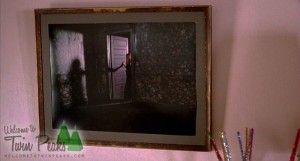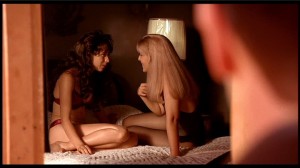Clint Eastwood directs his first and most accomplished western in years from a rather elaborate script by David Webb Peoples (who cowrote Blade Runner). Like Bird, this movie seems at times to equate dark cinematography with artistry (albeit with stunning use of locations in Canada and California and beautifully composed results), and as with White Hunter, Black Heart, its view of reality depends almost entirely on countercliches, and their implied critique of the machismo of earlier Eastwood movies. Eastwood plays a reformed alcoholic killer, now a widower, father, and failing hog farmer in Kansas, who gets lured into a bounty hunt by a brash kid (Jaimz Woolvett) and persuades an old partner (Morgan Freeman) to join them. Other important characters include two prostitutes (Frances Fisher and Anna Thomson), a gunman-turned-sheriff (Gene Hackman, rather like Karl Malden in One-Eyed Jacks), an English bounty hunter (Richard Harris), and a dime-novel writer (Saul Rubinek) who mythologizes the west. As a moral reconsideration of the role of violence in previous Eastwood films, this is strong and sure, and characters who play against genre expectations give the film a provocative, smoldering aftertaste. The only limitation, really, is that the picture hasn’t much dramatic urgency apart from its revisionist context. Read more
Nicolas Roeg’s tenth feature–rather freely adapted by Allan Scott (who also produced) from a novel by Brian Moore–is characteristically portentous and provocative, beautifully edited and lyrically enigmatic. Roeg’s wife, Theresa Russell, who has starred in four other Roeg films, plays the adulterous wife of a doctor (Mark Harmon) having an affair with another doctor (James Russo) while they’re attending a conference in Mexico. Her husband apparently dies in a boat accident, but his body mysteriously disappears from a local hospital; back in California she travels to Carmel, reencounters her husband, and investigates a vision that may be connected with her husband’s apparent death and resurrection. If you like thrillers with tidy denouements, this may not be your cup of tea. But Roeg’s grasp of his material never ceases to be serious and suggestive, and it carries echoes of such transcendental art movies as Stromboli and Vertigo. With Talia Shire, Richard Bradford, and Will Patton (1991). A Chicago premiere. (Facets Multimedia Center, 1517 W. Fullerton, Friday and Saturday, August 21 and 22, 7:00 and 9:00; Sunday, August 23, 5:30 and 7:30; and Monday through Thursday, August 24 through 27, 7:00 and 9:00; 281-4114) Read more
Shot with camera equipment and film stock furnished by Jon Jost, the third feature from radical independent writer-director-cinematographer-editor Gregg Araki–after the award-winning Three Bewildered People in the Night and The Long Weekend (O’Despair)–is a talky but potent doomed-couple-on-the-run picture in which both leads are desperate young men who recently tested HIV positive. Jon (Craig Gilmore) is a sometime film critic who lives in LA, and Luke (Mike Dytri) is a cop killer on the run; in a rough parallel to Godard’s Breathless, Gilmore plays Jean Seberg to Dytri’s Jean-Paul Belmondo. After beginning with episodes involving Luke in flight from murderous women (including Mary Woronov) that seem more misogynistic than satirical, the film settles down to something more serious and affecting, though not always more lucid. The main postmodernist references Araki has in mind are plainly Godard and Antonioni, and the sincerity and purity of his rage often gives this film more bite than its verbose and raw dialogue; a sharp sense of camera and editing rhythm helps (1991). (Music Box, Friday through Thursday, August 14 through 20) Read more
Andrei Tarkovsky’s first major film, cowritten by Andrei Konchalovsky, about a 15th-century icon painter. This medieval epic announced the birth of a major talent; it also stuns with the sort of unexpected poetic explosions we’ve come to expect from Tarkovsky: an early flying episode suggesting Gogol, a stirring climax in color. Not to be missed (1965). (Film Center, Art Institute, Columbus Drive at Jackson, Saturday, August 15, 7:00, and Sunday, August 16, 6:00, 443-3737) Read more
Like Monsieur Hire, Patrice Leconte’s subsequent feature (1990), written with Claude Klotz, is a claustrophobic, bittersweet tale of middle-aged sexual obsession filmed in ‘Scope. But I enjoyed this film more, perhaps because the colors and moods tend to be brighter, with more of a sense of comedy. After 40 years of dreams about marrying a hairdresser, the hero (Jean Rochefort) finally meets the manager of a salon (Anna Galiena) who happens to be married to the owner. Peter Greenaway regular Michael Nyman composed the music; with Roland Bertin and Maurice Chevit. (Fine Arts) Read more
A fascinating documentary by Madeleine Ali, an American black woman who has converted to Judaism, about a group of black teenagers from a high school for “problem kids” in Brooklyn’s Bedford-Stuyvesant who spent ten weeks living and working on an Israeli kibbutz. Ali carefully and, to all appearances, quite objectively chronicles the entire experience, from anticipation in Brooklyn to initial alienation and frustration at the kibbutz to passionate commitment to disappointment about leaving. Branford Marsalis provides an effective jazz score. (Film Center, Art Institute, Columbus Drive at Jackson, Sunday, August 9, 4:30, 443-3737) Read more
Writer-director-producer Darryl Roberts’s second Chicago-made feature (1992), a vast technical advancement over The Perfect Model (1989), still shows that he has a lot to learnin particular, how to tell a story and how to prune a script. But his flair for dialogue and his spirited cast (which includes Darnell Williams, Salli Richardson, Daniel Gardner, Raymond Whitfield, Debra Crable, Jonelle Kennedy, and Charnele Brown, as well as himself) keep one of the talkiest movies within memory going. A comedy about relationships among young blacks, it bristles with enough issues and personalities to compensate for much of the shapelessness. (JR) Read more
Nicolas Cage loses his fiancee (Sarah Jessica Parker) to James Caan in a poker game and a flock of Elvis impersonators go skydiving over Las Vegas, in an enjoyable though distinctly second-degree comedy by writer-director Andrew Bergman. Full of fun around the edges, it’s rather flat and unfelt at the center. (The three leading characters would make more sense in an Esther Williams musical than in a character comedy like this one.) It’s not on the level of Bergman’s So Fine and The Freshman, but you might have some fun with it. With Johnny Williams, John Capodice, Robert Costanzo, Anne Bancroft, Pat Morita, Peter Boyle, and Seymour Cassel. 95 min. (JR) Read more
It seems a pity that the controversial black film pioneer Oscar Micheaux is known nowadays mainly for his technically rough and transgressive sound films, when films such as Body and Soul (1924) indicate that he was a highly skilled silent director. Within Our Gates (1919) premiered in Chicago in early 1920 and was then banned for its treatment of a southern lynching. 79 min. (JR) Read more
A highly realistic and convincing treatment of homeless runaway teenagers on Hollywood Boulevard, this feature was directed by Marc Rocco, who collaborated on the script with Michael Hitchcock and Kurt Voss. The strong cast includes Dermot Mulroney, Balthazar Getty, Sean Astin, Ricki Lake, James LeGros, and Lara Flynn Boyle as the runaways; an uncredited Kyle MacLachlan and Laura San Giacomo in smaller parts; and Peter Dobson, Adam Baldwin, Nancy McKeon, and Stephen Tobolowsky. Aside from one slow-motion sequence, the film treats its subject with few commercial concessions, so one hopes that the horrible and decidedly unmemorable title won’t keep people away; this may be the best movie to look at disaffected youth since River’s Edge and Pump Up the Volume. (JR) Read more
From the Chicago Reader (August 1, 1992). Having recently seen or reseen the “complete” Twin Peaks to date, in the splendid Blu-Ray box set (subtitled The Entire Mystery and The Missing Pieces), I no longer agree with this review. I was obviously part of the backlash consensus that was still recovering from the gradual deterioration of the series during its often lamentable second season (only part of which I’d watched at the time), and though I still regard this prequel feature as uneven and at times uncertain — an impression confirmed by the 90-odd minutes of deleted or initially trimmed sequences found in the box set’s extras, some of which are superior to many of the scenes included in the original release version — it clearly deserved more respect and attention than it got from me and most other reviewers at the time.
So I’m happy to learn that Lynch and Mark Frost are now preparing nine new Twin Peaks episodes — all of them to be directed by Lynch, to be set in the present, and to air on American cable TV’s Showtime in 2016. — J.R.


The 1992 prequel to David Lynch and Mark Frost’s famous but short-lived TV series, this deals with the events leading up to the murder of Laura Palmer (Sheryl Lee) in a Pacific northwest town that suggests a somewhat funnier and kinkier version of Peyton Place. Read more
Noel Black’s odd, creepy thriller came out of nowhere in 1968 and almost dropped out of sight shortly thereafter, though it’s built a small but solidly deserved cult reputation in the years since. Anthony Perkins is a nice young man who once liked to set fires and was incarcerated as a result; Tuesday Weld is the squeaky-clean cheerleader who understands and then some. With Beverly Garland and Dick O’Neill. 89 min. (JR) Read more
Shot with camera equipment and film stock furnished by Jon Jost, the third feature from radical independent writer-director-cinematographer-editor Gregg Arakiafter the award-winning Three Bewildered People in the Night and The Long Weekend (o’ Despair)is a talky but potent doomed-couple-on-the-run picture in which both leads are desperate young men who’ve recently tested HIV positive. Jon (Craig Gilmore) is a sometime film critic who lives in LA, and Luke (Mike Dytri) is a cop killer; in a rough parallel to Godard’s Breathless, Gilmore plays Jean Seberg to Dytri’s Jean-Paul Belmondo. After opening episodes involving Luke’s flight from murderous women (including Mary Woronov) that seem more misogynistic than satirical, the film settles down to something more serious and affecting, though not always more lucid. The main postmodernist references Araki has in mind are plainly Godard and Antonioni, and the sincerity and purity of his rage often give this 1991 film more bite than its verbose and raw dialogue; a sharp sense of camera and editing rhythm helps. 92 min. (JR) Read more
A 1991 Dutch documentary by Hans Hylkema about the highly talented jazz reedman and flutist Eric Dolphy, who played memorably with Chico Hamilton, Charles Mingus, and John Coltrane as well as in groups of his own, and who died at the age of only 36. The film’s cowriter, Thierry Bruneau, traveled to New York and Los Angeles to document Dolphy’s beginnings; footage of Dolphy performances in Oslo and Stockholm is included. (JR) Read more
Essential viewing. Anna Magnani plays the head of a commedia dell’arte troupe touring colonial Peru in the early 18th century who dallies with three lovers (Paul Campbell, Ricardo Rioli, and Duncan Lamont) in this pungent, gorgeous color masterpiece by Jean Renoir, shot in breathtaking images by his nephew Claude (1952). In fact, this filmic play-within-a-play, based on a Prosper Merimee stage work, is a celebration of theatricality and a meditation on the beauties and mysteries of actingit’s both a key text and pleasurable filmmaking at its near best. Though generally regarded as a French film, the original and better version is in English, which is almost invariably what gets shown in the states. With Odoardo Spadaro, Nada Fiorelli, and Jean Debucourt. 101 min. (JR) Read more


